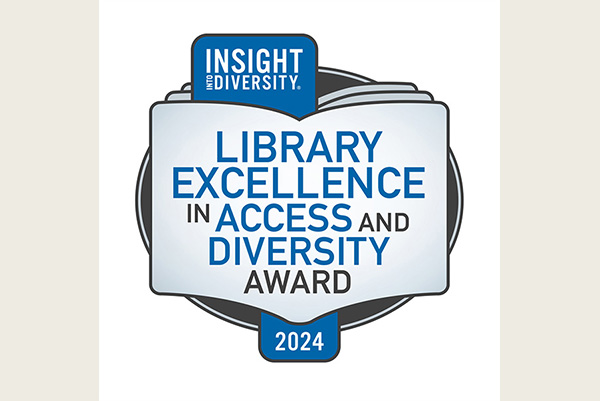Miami University Libraries receives 2024 Library Excellence in Access and Diversity (LEAD) Award
Insight Into Diversity magazine’s inaugural award for academic libraries honors dedication to diversity, inclusion, and access

Miami University Libraries receives 2024 Library Excellence in Access and Diversity (LEAD) Award
Miami University Libraries has been named a recipient of the inaugural Insight Into Diversity magazine 2024 Library Excellence in Access and Diversity (LEAD) Award.
The LEAD Award honors academic library programs, policies, and initiatives that encourage and support diversity, equity, and inclusion across their campus and surrounding community. These include, but are not limited to, research, technology, accessibility, exhibitions, and community outreach.
Miami University Libraries, along with 55 other recipients, will be featured in the March 2024 issue of Insight Into Diversity magazine. This award recognizes the Miami University Libraries system, including King, Wertz Art & Architecture, Rentschler, and Gardner-Harvey Libraries.
Miami University Libraries is a cornerstone for the university, with its work impacting across the entire institution, Dean and University Librarian Jerome Conley said.
“Progress and momentum in diversity, equity, and inclusion (DEI) doesn’t come from any specific initiatives or a taskforce, rather, it comes from a cultural shift. Miami’s commitment to inclusion and the culture on campus is what creates the space for us to push boundaries and catalyze change,” Conley said.
Insight Into Diversity honored Miami University Libraries for initiatives including:
Diversifying Collections
- Purchasing materials based on gaps found by students and faculty, such as discovering Special Collections has only one diary written by a woman about the Civil War but many accounts from men. (Read about the signature 50th anniversary purchase of the Walter Havighurst Special Collections and digitization of the collection).
- Working to ensure there is a variety and diversity of voices that better reflect history.
- Digitizing the Dr. Carolyn Jefferson Jenkins collection to ensure it is accessible.
Student-Focused Events
- Annual events aimed at supporting diverse populations such as military-affiliated students, commuter students, and others, featuring activities relevant and engaging for each population.
- Engaging student workers: Student workers in Special Collections. Makerspace, and Circulation are actively involved in diversity efforts related to collections and digitization.
Affordable Learning Initiatives
- The DEI Textbooks on Reserve program expands the existing Textbooks on Reserve collection.
- DEI grants: opportunities for the Libraries’ community to seek funds for DEI-focused ideas and projects not regularly funded through department budgets. These grants serve to increase DEI efforts, initiatives, and training within the Libraries.
- Libraries Award for Undergraduate Research and Excellence (LAURE)
Welcoming and accessible physical and virtual spaces
- Among other efforts to increase accessibility in many physical spaces, King LIbrary in the past year has added electric height-adjustable tables, accessible charging stations, and changing stations in restrooms throughout the building.
Larger Projects
- Lived Experiences Through Storytelling: Race at Miami University collaborative storytelling project that chronicles the history of racial dynamics at Miami through documentaries, oral histories, and archival stories of students, alumni, faculty, and staff of color.
- OhioLINK Luminaries Program offers students a unique, paid opportunity in academic libraries not available in traditional internships or part-time campus employment with the goal of increasing diversity in the information literacy profession.
Lenore Pearlstein, owner and publisher of Insight Into Diversity magazine, said, “We know that many academic libraries are not always recognized for their dedication to diversity, inclusion, and access. We are proud to honor these college and university libraries as role models for other institutions of higher education.”